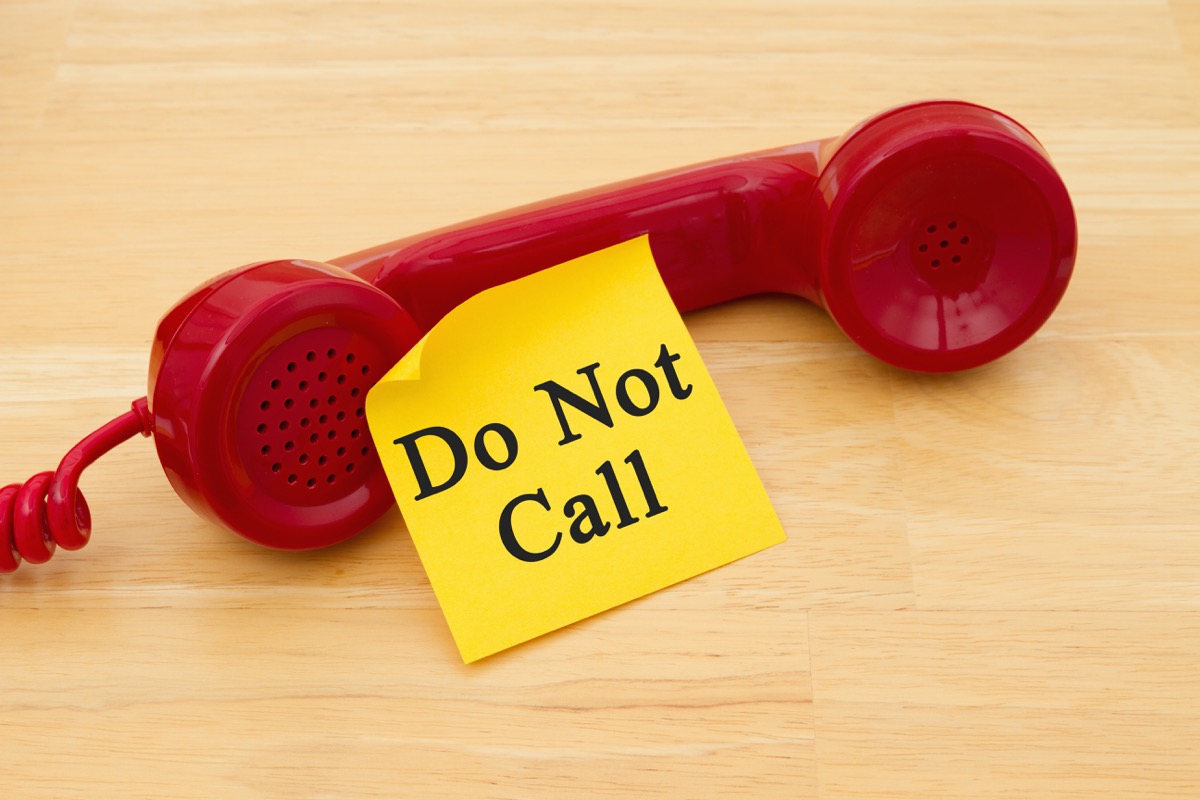Telemarketer Calls: The Secret Dos and The Dont's From Those Ringing You Non-Stop
Here are the tricks telemarketers use to get you to answer them.

Over the past 20 years, a whole lot has changed in regards to technology and communication. But one thing has remained a constant: the annoyance of telemarketers. Not too long ago, landlines rang off the hook with sales calls. Today, your smartphone suffers a deluge of unknown numbers. While the proliferation of mobile technology once had many people predicting the demise of telemarketing, the industry remains robust. In fact, there are more than 26,000 telemarketing companies in the United States alone—and the industry grew 3 percent in 2019, according to IBISWorld.
But even though telemarketers have been a part of our daily lives for years, there's a lot we still don't know about them—and about how to evade them. However, that's all about to change. Read on for all the secrets of the telemarketing trade that have long been kept under wraps.
1
The best thing you can do is answer a telemarketer's call.

If you don't want to be called back by a telemarketer, your best move is to let them talk—at least for a few seconds. Not answering "results in the telemarketer marking your lead as 'no answer' and calling you back until they actually have a conversation with you," former telemarketer Erica Elson explained in an article on Lifehacker. Instead, let them make their case and then tell them you're not interested and would prefer not to receive future calls. That will get your name crossed off their list for good. Just a few seconds up front saves you countless frustrations in the future.
Another experienced telemarketer explained on Reddit that telemarketers have three main ways that they mark a number on their list: "Delete," "Do Not Call," and "Redial." If you say you don't want anything, you fall under "Delete." If you ask to be put on the "Do Not Call" list, you won't be called again by that company. But "all other interactions fall under 'Redial,'" the Redditor wrote. "The numbers auto-dial from a machine and that thing will call twice a day until the end of time. Answer the phone and say something."
2
And ending the call immediately means you're definitely getting a call back.

For most of us, having someone hang up in the middle of a call is a pretty clear indication that they don't want to speak anymore. But for telemarketers, the move can provide an easy reason to call back again. Elson explained that hanging up mid-conversation, with no explanation, "will most likely result in the telemarketer calling back, claiming you got 'disconnected.' If you don't answer then, they will keep calling."
2
Using your schedule as an excuse guarantees a follow-up call, too.

Pushing off a telemarketer with the old "this isn't a good time" would seem like the kind of heavy hint that clearly conveys your disinterest. But a schedule-based comment actually serves as an invitation for a telemarketer. "When you say, 'This isn't a good time,' the telemarketer hears, 'Call me back later!'" Elson noted. "When you say, 'Sorry, I don't have time to talk about this right now,' the telemarketer hears, 'I will buy this another day!'"
4
Threatening a telemarketer is useless.

Telemarketers can often be maddening. But if you find yourself on the receiving end of a cold call, you'll want to keep any feelings of anger in check, for a number of reasons. The first is obvious: It's unnecessarily unkind to yell at someone who's just doing their job. "Remember, the people making the calls are people too," the telemarketer explained on Reddit. "I've had people threaten to hunt me down and murder me… I have watched grown men cry softly at their desk because the person on the other line broke down everything they ever thought was good about their lives. I know telemarketers are annoying, but we are human. Most people do this kind of work because they have no other options."
And if that's not enough to convince you, consider that using violent language is likely to lead to a call back. "Even though they should delete a call if the person is rude, [a telemarketer] might just hit redial as retaliation," the Reddit telemarketer noted. "The person calling you ultimately has the power to hit whatever [button] they want."
5
You probably asked for the information telemarketers are calling you about.

The fact is, telemarketers are about as interested in speaking with an uninterested consumer as you are in hearing an irrelevant sales pitch. So it's no coincidence that, after you fill out a survey or request a quote, you're suddenly getting calls that pertain to the information you looked up.
"When you request an auto quote online, expect to be bombarded with calls from many different companies," an anonymous insurance telemarketer told Consumerist. "What happens is that the lead aggregator collects the quote, and then sells it to various agents and carriers, who then contact the requester. We pay approximately $8 for every 'hot' lead."
6
The Do Not Call registry doesn't limit all calls.

If your number is one of the more than 240 million on the Do Not Call (DNC) registry, there's a good chance you still get called by telemarketers. That's because there are some big loopholes in what calls are and aren't prohibited: The DNC list only puts the kibosh on sales calls. But there are a number of types of calls that are still allowed—including surveys, informational calls, political calls, and calls from charities or debt collectors.
7
The DNC list also has a three-month delay.

Another reason why you might still get calls even when you've put your number on the DNC list is that there's a leniency window. "Even if your phone number is on the Do Not Call list, we can contact you up to 90 days after [you ask to be put on the DNC]," the anonymous telemarketer told Consumerist.
Unsurprisingly, telemarketing companies can—and do—take advantage of that lag time. But there is a solution. "To get the call to stop, just say 'put me on your "Do Not Call" list' or 'do not call this number again,'" the telemarketer said. "You must say it when you pick up the phone."
8
There's an even more powerful option than the DNC registry.

Sure, you might be receiving calls from countless different sales companies. But there are just a few companies that provide "master" lists that all telemarketers use, like InfoUSA, for example. Next time, simply ask the caller where they got your number from—there's a good chance they'll tell you. According to the telemarketer on Reddit, "with this information, you can get into contact with the companies that supply your number and take it [off] their list."
9
Effective telemarketers don't follow a script.

Expert telemarketers know that sticking firmly to a script can come across as robotic and will fail to create a connection with prospective buyers. "I focus on the conversation that my agents have, not the 'script,'" sales manager Jonathan Marc Hairgrove wrote on Quora. "I know we find our success from having calls made by those who are conversational and not robotic."
But while a more personal and conversational tone can enhance the impact of a sales attempt, telemarketers are still following a trajectory to guide them in the conversation.
10
They know the way to your wallet is through your heart.

The most effective way to keep a buyer on the phone is often to connect with them emotionally. "When we have someone who wants to discuss the services that we provide, we don't jump right into the sales script," says Shawn Breyer, owner of Breyer Georgia, which purchases homes from those looking to sell. So, instead of talking about the home's value or financial opportunities, Breyer says, "We like to ask them what their favorite memories were in the house, what their kids are like, what they want to do with the next chapter of their life. What we ask isn't really important. What is important is that we genuinely get to know them, ask them questions about themselves, and just shut up and listen."
This approach has had proven results for Breyer: Before implementing the practice, his company was buying about one house for every 27 leads. Now, they buy one house out of every 15 leads.
11
They want to keep you on the line for at least 15 minutes.

A quick-turnover approach in which the salesperson runs through their script and moves on to the next number on their list is likely to get similarly disengaged results. When Breyer's sales team shifted to appealing to prospective clients' emotions, they found that while their sales increased, the amount of time spent on a call also more than tripled.
"We spend an average of 17 minutes on the phone with each quality lead that we have prior to setting an appointment to really solidify that rapport with the customer," says Breyer. "Before, we were spending roughly five minutes on the phone with them just to qualify them."
12
They know all the things you're scared of—and they use them to their advantage.

In 2016, data scientists at Gong analyzed more than 25,500 sales calls in an effort to identify patterns in the most effective calls. One of the most consistent predictors of success was the use of "risk-reversal language." That's when a salesperson stresses all the ways they're protecting you from dissatisfaction or disappointment. Using that kind of language increases a salesperson's odds of success by an average of 32 percent.
As Gong's senior director of product marketing, Chris Orlob, explained in an article for HubSpot, good telemarketers will "proactively, frequently, and aggressively talk about terms of the deal that are designed to protect the customer from risk." Mentioning easy cancellations, no long-term contracts, money-back guarantees, and the like helps to seal the deal.
13
They want to spend more time listening than speaking.

If you're speaking more than the seller is, they're doing their job well. In their research, Gong found that, on average, calls that resulted in sales were ones in which the buyer spoke more than the seller. Specifically, they found that the ideal talk-to-listen ration for a telemarketer was 43:57, which is roughly one minute of talking for every 1.3 minutes of listening.
14
They're generally honest.

For those of us with a healthy amount of skepticism of anyone trying to sell us on something, the idea that telemarketers are telling the truth might seem pretty unlikely. But good telemarketers try to avoid lies. "Falsehood, scamming, and confusing a customer to purchase will eventually result in a downfall," says C. Shakhawat Sultan, business development manager at website design firm CodeRex, who has a long history in telesales and marketing.
This isn't just ethical—it also results in more sales in the long run, according to Sultan. He says that providing deceptive or partial information might mean customers hear what they want to hear and agree to placing an order. But following the call, if they get the sense that the seller misled them, they may cancel the order or return the product ultimately.
15
They always try to play nice with competitors.

Negativity is a turnoff to buyers and can sink a sale. So there's a good chance that the telemarketer you speak with will try to keep things positive—even when discussing the other guy's products. "You need to compare and prove that you are the better provider," says Sultan. However, that doesn't mean insulting your competitors. "The competitor is good (not bad), but your product or service is better," he says.
Take Sultan's example of selling cable TV. Instead of pointing out that the competitor provides only 80 channels compared to the 100 you provide, good telemarketers will give the statement a positive spin, emphasizing that they will provide the 80 channels the competitor offers, plus 20 extra channels for a comparable price. "I didn't say, 'They provide fewer channels,'" says Sultan. "Rather, I focused on how we provide more channels. The focus should be on the benefits you can provide, not how much better you are than the competitors. The customer buys the benefits, not the product."
16
They're smiling when they call you.

Any salesperson knows that body language is crucial to connecting with a customer, and that closing a deal is often more about what's unsaid than what's spoken aloud. And even in a phone conversation, nonverbal communication is powerful. A 2008 study published in the journal Speech Communications found that listeners on the phone can tell not just if the person on the other end is smiling, but the kind of smile they're making, and how enthusiastically they're making it. Telemarketers know that, even when no one can see it, body language still has an impact.
"People can hear the energy in how you sit and act," says Angela Bradford, senior marketing director for World Financial Group. "I walk and call a lot and it works well." Bradford says that if a telemarketer doesn't sound excited, "the people on the other side won't be either."
17
"Gatekeepers" are their biggest enemies.

One of the greatest challenges every telemarketer must overcome is the "gatekeeper"—the person who separates them from the person who they want to buy their product. A gatekeeper can be a receptionist, an assistant, a spouse, a child, or anyone else who happens to pick up the phone.
There are numerous telemarketing strategies for dealing with gatekeepers, but one of the most of effective ones is treating them kindly, considering the power they have. EksAyn Anderson, author of The Key to the Gate, told Forbes that one customer said to him: "I have people call me all day and you are the first one I've allowed to come in to show me your product—because you were so nice to my secretary." And for more secrets from an entirely different industry, here are 20 Secrets Police Officers Don't Want You to Know.
To discover more amazing secrets about living your best life, click here to follow us on Instagram!





















